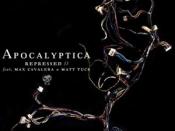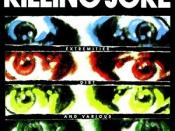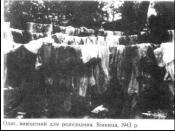Since the 1980's till today, one of the most controversial in law and psychology has been the validity of repressed memory. Repressed memory refers to a memory of experience, especially a traumatic one that is recalled after an often lengthy period of time. In this essay it is argued that repressed memory should not be used as evidence in court. Four main arguments are presented against the validity of repressed memory used as evidence in court. First, evidence from cases in America suggests that people use repressed memory as a use of financial gain within the American court system. Second, research shows the unreliability of repressed memory. Third, it is difficult to distinguish false memories from true memories. Fourth, is a repressed memory can be induced.
One of the most controversial issues in psychiatry and law today is the so-called "Repressed Memory Syndrome." Repressed memories are traumatic memories which have been buried only to reemerge much later (Gleaves, D.H.,
Smith,S.M., Butler, L.D. & Spiegel, D. (2004). These memories are often of a highly emotional nature, such as violent crime or child abuse. There have even been instances of people claiming to have recovered memories. Revived memories, often brought to the surface by psychiatrists and hypnotists asking leading questions, are often used in court cases alleging child abuse, rape, and other emotionally-charged crimes years after the fact. While many therapists hold that repressed memories are valid, many critics both inside and outside the mental health community contends that repressed memories are just suggestions planted by therapists and therefore have no value.
The first argument against the validity of repressed memory used as evidence in court is that many citizens in America have been documented to use the excuse of repressed memory to gain financially. Repressed Memory Syndrome (RMS) is...



Repressed memory syndrome
Why did this essay earn only a "C+"? After going through it, I find three reasons. First and most simply, the writer did not proofread this essay. There are several little glitches that are clearly errors on the part of the writer, errors that irritate any reader, and should be removed before the essay is handed in.
Second, the argument that people who bring repressed memory cases to court are doing so only for the money is absurd. First of all, the 'evidence' cited to support this claim is this:
"The FMSF describes the FMS phenomenon as "… one in which people (mostly well- educated, financially comfortable women in their 30's) recover memories which others say are false, become obsessed with the memories and isolate themselves from their family" (qtd. in "Backlash," 1994). Implicit in this statement is the assumption that those who suffer from FMS are seeking financial gain." The source of this quote is an advocate, who clearly has a bias against the use of recovered memories, and the implication is far-fetched.
Yes, people in some recovered memory cases have sometimes won large settlements, but to do so, they must convince a jury that they have a valid case. It is hardly automatic.
Finally, this essay misses a critical point completely: what is the test for allowing evidence into court. Certainly, ome material is not allowed in court. For example, if I contend that I see a demon on your shoulder coaching you to say evil things, I am not allowed to testify about that. It is called spectral evidence, and while it was once allowed, it is no longer. (Most of the people hanged for witchcraft in Salem, Massachusetts were convicted based on spectral evidence.) This essay never considers the test that courts apply to decide if something like repressed memory evidence is sufficiently valid to be admissible. That lapse is very serious in an essay on this topic.
1 out of 1 people found this comment useful.